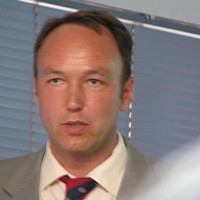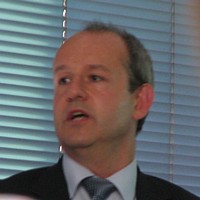The invasion by Austrian Economics of the Institute of Economic Affairs continues apace, and at lunchtime today I attended this IEA event on that very timely subject staged by the Cobden Centre. The weather today has been so hot that since this meeting I could hardly stay alive and then when I had staggered home, awake, so don’t expect a long and detailed report of what was said. All I really want to say here, now, is that I was greatly impressed by the two speakers, both of whom I photographed in action:


These two gentleman are, on the left, Jörg Guido Hülsmann, and on the right, Sean Corrigan. Watch out for those names. I’m fairly sure that quite a bit more is going to be heard of and from both.
The good news is that Cobden Centre Chairman Toby Baxendale asked both these two gentlemen if their performances could later be made available in written form to the Cobden Centre with a view to online publication, and both promised that they would cooperate fully with such plans.
I took other photos, including a couple of Tim Evans, the Cobden Centre’s Chief Executive. In one of these snaps, Tim poses next to the IEA’s evil monetarist Tim Congdon, who was present only as a picture on the wall.
Tim said that he also thought the speeches by the two gents above to be “superb”. He says that about any performances he has had any part in organising no matter how average, but this time I think he meant it. And as I say, I enthusiastically concur. Judging by the response at the end from a gratifyingly crowded room, everyone else present did too.




It was an interview with Sean Corrigan on CNBC several years ago that first led me, by various paths, gold, etc, to the Austrian school and to the Mises Institute.
Main stream media can’t help but do somethings good sometimes!
But I doubt they have had Mr Corrigan back. He talked too much sense for those whose primary mission in life is to keep six, eight or twelve impossibilities in the air at the same time.
And Jörg Hülsmann writes brilliantly.
One can only hope that common sense may prevail over gibberish. Well, it will in the end, but will it be too late for us?
Not if the ideas of people such as these are made widely available.
Congratulations in doing that.
Talks by Hulsmann can be found on YouTube and elsewhere. Here’s Hulsmann telling the life of von Mises(Link).
On CNBC – well it is owned by General Electric (with all that implies – indeed the head of GE personally warned CNBC people not to attack the policies of Obama, after the comments of one CNBC people set off the Tea Party movement).
However, most organizations do not need to tell their journalists to stick to the leftist script (they internalize this ideology at school and university) so the very fact that that GE top brass has to step in shows that their are some good peopel at CNBC (and old Jeff may be cooling on Comrade Barack – he may even have worked out what Barack Obama’s long term intentions are concenring General Electric).
So I think it is possible that Mr Corrigan may be back on CNBC at some point – certainly people like Mr Rogers have never been banned.
As for monetarists – I understand that Brian was being playful.
However, there is a defence to be made. Not all monetarists are in favour of bailouts – Tim Congdon does not speak for all of them (as for calling banker special pleader Tim Congdon “evil” – I do not have a problem with that).
We should also remember that the subsidies are not just big things like TARP.
The whole structure of Central Banking subsidizes the banks.
For example, the “discount window” – try to get money from a government Central Bank at the rate of interest banks pay.
Try either as an individual or as (say) a steel company or whatever.
You can not get these sweetheart loans (for that is what they are).
Of course these days the banks borrow money from government Central Banks and then lend it back to the same governments (via the Treasury departments) at a higher rate of interest – so much for bank “profits” (they are hardly created by hard work and skill).
But even in times of balanced government budgets the Central Bank support for wild folly in the banking system continues – see (for example) the antics of Ben Strong (head of the New York Federal Reserve Bank) in the late 1920s, or the antics of Alan Greenspan (year after year, bubble upon bubble).
This is why the old “Chicago School” (basically pre World War II) were against the whole corrupt system. They were not Austrian School – but they know rotteness (economic and moral) when it was in front of them (Tim Congdon most likely thinks of it in terms of “good business” and a way to “expand the economy” more than getting all loans 100% from real savings would).
As for Milton Friendman (the monetarist of modern times – we are not talking about empty headed Fisher of Yale here).
Milton Friedman said lot of different things at different times – some good, some bad.
It is impossible to do him justice in a comment – at least I can figure out how to do it.
I thought Hulsmann was excellent, though perhaps a little coy when asked about his position on fractional reserve banking in a free money system. Corrigan was harder to follow. I think he tried to cram in too much into too little time. Also his proposals sounded a bit Adam Smith Institute-ish, if you know what I mean. Still it was good to see Austrian Economics being given such a prominent airing at the IEA. Well done to Toby Baxendale for funding it and to Mark Littlewood for opening the doors of the IEA to such an event.